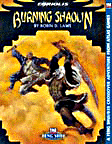
|
About OgreCave and its staff
|

|
by Joe G. Kushner
First off, the module doesn't try to provide conversion notes on how the stats from one game system were translated to another. It just provides dual sets of stats. Secondly, the d20 material is clearly indicated by red text. This leaves no confusion as to what parts of the module belong to what game system. If you're a Feng Shui player, just ignore everything red. Note that the same can't be said the opposite way because parts of the basic text involving the module are going to be read by both groups. So what does the module provide? It starts with an introduction to how the module is laid out and what Feng Shui is. In d20 terms, the module is for 7th to 9th level characters; for Feng Shui, beginning characters are apropriate. The module is broken up into an introduction, a fade in, three acts, a fade out, and a sequel. The chapter layout should be familiar to Feng Shui fans, but to d20 connoisseurs, it should read like this: introduction, background material, three chapters, consequences, and further adventures.
The Plot
What's Not To Like? Things that I personally didn't' like? Very little here not to like. The layout and art are improved from Atlas' first d20 products, the Penumbra titles. The outer side is bordered in black with gray oriental characters standing out slightly with red symbols leaping off the page. The contrast of the red D&D text marked with a red symbol, as opposed to the Feng Shui black symbol, create text sections that are very different and easy to reference to when flipping through the book. The credits and open game license don't take up whole pages, and there is only one advertisement page. Now while I would've preferred that the interior cover was used for the OGL and the ad, the 32-page module is reasonably priced ($8.95) and such cover use would've probably driven the price up. For those players who enjoy both game systems, this module has twice the replay value. For players who favor the d20 side, the module does lean toward them with new rules, magic items, and monsters, and more importantly, plenty of Feng Shui attitude. As a Feng Shui module, it works great for new players and allows new GMs to see how a structured adventure can work. Me? I'm waiting for the next product, one that crosses over Unknown Armies in Renaissance Times with the d20 game.
|
||
 The first in the new
The first in the new